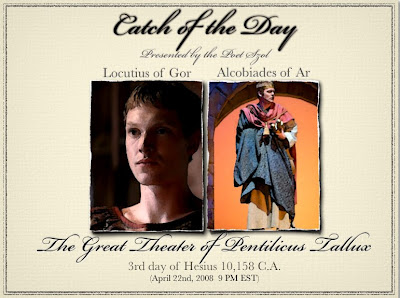Sentiment of the Day
 If I write, and you are moved, I have done my due diligence. If you find, despite your best efforts, you are not ambivalent to my indulgent rambling, I have made my point. You may agree whole-heartedly with my sentiments, raising a defiant fist in support, or you may spit, unable to contain the bile rising in your throat. So much of what I write fades from this physical plane; withered and dog-eared pages burned to ashes, lost to time, or graffiti upon the walls white-washed or rinsed away by the rains. If I have a place in history, if I am to be remembered for song, slogan, soliloquy, or slur, it will be because you keep my words, tenuous things they tend to be, deep in your heart.
If I write, and you are moved, I have done my due diligence. If you find, despite your best efforts, you are not ambivalent to my indulgent rambling, I have made my point. You may agree whole-heartedly with my sentiments, raising a defiant fist in support, or you may spit, unable to contain the bile rising in your throat. So much of what I write fades from this physical plane; withered and dog-eared pages burned to ashes, lost to time, or graffiti upon the walls white-washed or rinsed away by the rains. If I have a place in history, if I am to be remembered for song, slogan, soliloquy, or slur, it will be because you keep my words, tenuous things they tend to be, deep in your heart.
Catch of the Day was performed last evening in The Great Theater of Pentilicus Tallux. Due the greatness of the actors Locutius and Alcobiades, their ability to deliver the words I pen with proper pace and sentiment, I believe it went well. Not every patron in the tiers received it favorably, but I do not recall an ambivalent reaction among them. Perhaps the words were more divisive than many would find polite, but that is only indicative of the divisions of the day. I do not speak of mere privileges. For the record, I believe in the structure of caste, in the fitness of a society in which every man pulls his weight by engaging in what he was born to, and born to do. Each of us has our role to play. Mine is to write verse addressing the glory of my city, to recite prose dedicated to the wonder of love, lust, and the range of human emotion - but there is more. The Poet is a bellwether against corruption, conspiracy, and a catalyst for change. Today's current events are tomorrow's history. While I would not be so bold as to think a Poet should write the history of his day, such things are for Warriors to forge and studious Scribes to record, my caste does what others cannot. We record the sentiment of the day. We are not here to record the chronology of things. If you wish to know what occurred during the life of Szol, you will find little in the lines of his poetry and less in the dialogue of his plays to form a complete history. What you will find in these things, however, is far more telling. You will know what men felt.




